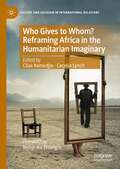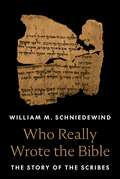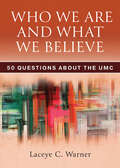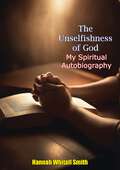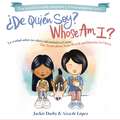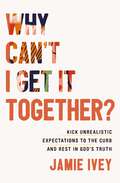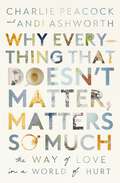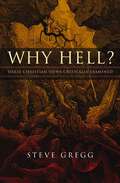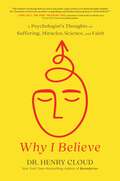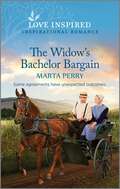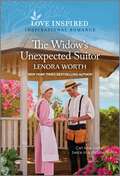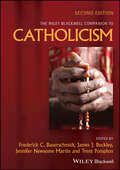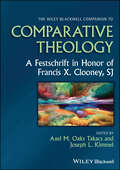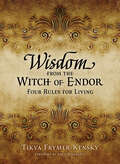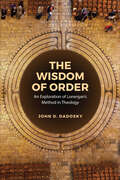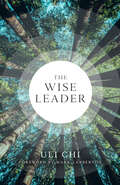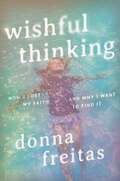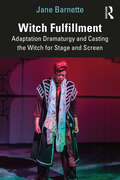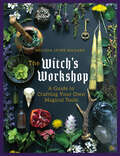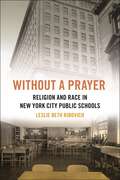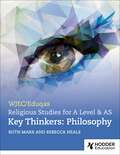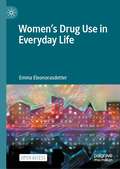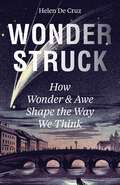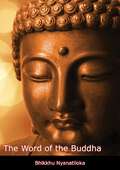- Table View
- List View
Who Gives to Whom? Reframing Africa in the Humanitarian Imaginary (Culture and Religion in International Relations)
by Cilas Kemedjio Cecelia LynchIn this innovative volume, experts from international relations, anthropology, sociology, global public health, postcolonial African literature, and gender studies, take up Ngūgī wa Thiong’o’s challenge to see how Africa gives to the west instead of the reverse. Humanitarian assumptions are challenged by unpacking critical legacies from colonial and missionary genealogies to today’s global networks of nongovernmental organizations (NGOs). Who Gives to Whom: Reframing Africa in the Humanitarian Imaginary is a decolonial gesture that builds on Ngūgī’s work as well as that of pan-Africanist and intersectional feminist scholars. Contributions range from assessing the impact of historical legacies of colonialism on gender, religious/secular attempts at “saving” Africans to (South) African unrealized project to reconfigure foreign policy frameworks shaped by apartheid. Case studies of “silver bullet” solutions focus on the incorporation of women in peacebuilding, microfinance, and e-waste disposal, to argue that humanitarian interventions continue to mask ongoing forms of despoiling African well-being while shortchanging intersectional African forms of agency.
Who Really Wrote the Bible: The Story of the Scribes
by William M. SchniedewindA groundbreaking new account of the writing of the Hebrew BibleWho wrote the Bible? Its books have no bylines. Tradition long identified Moses as the author of the Pentateuch, with Ezra as editor. Ancient readers also suggested that David wrote the psalms and Solomon wrote Proverbs and Qohelet. Although the Hebrew Bible rarely speaks of its authors, people have been fascinated by the question of its authorship since ancient times. In Who Really Wrote the Bible, William Schniedewind offers a bold new answer: the Bible was not written by a single author, or by a series of single authors, but by communities of scribes. The Bible does not name its authors because authorship itself was an idea enshrined in a later era by the ancient Greeks. In the pre-Hellenistic world of ancient Near Eastern literature, books were produced, preserved, and passed on by scribal communities.Schniedewind draws on ancient inscriptions, archaeology, and anthropology, as well as a close reading of the biblical text itself, to trace the communal origin of biblical literature. Scribes were educated through apprenticeship rather than in schools. The prophet Isaiah, for example, has his &“disciples&”; Elisha has his &“apprentice.&” This mode of learning emphasized the need to pass along the traditions of a community of practice rather than to individuate and invent. Schniedewind shows that it is anachronistic to impose our ideas about individual authorship and authors on the writing of the Bible. Ancient Israelites didn&’t live in books, he writes, but along dusty highways and byways. Who Really Wrote the Bible describes how scribes and their apprentices actually worked in ancient Jerusalem and Judah.
Who We Are and What We Believe: 50 Questions about the UMC
by Laceye C. WarnerClear answers to common questions.This small, simple, and shareable book about The United Methodist Church is a helpful reference guide to everything that makes The UMC distinctive. Written in a clear, accessible style by Laceye Warner, Who We Are and What We Believe: 50 Questions about the UMC contains answers to fifty common questions about who United Methodists are, what we believe and practice, and what sets us apart. Use it alone or as a companion to Knowing Who We Are: The Wesleyan Way of Grace.
Wholly For God The True Christian Life: The True Christian Life (classic Reprint)
by William Law"Wholly For God: The True Christian Life" by William Law is a timeless and deeply spiritual guide to living a life fully devoted to God. William Law, an influential 18th-century Anglican theologian and mystic, provides profound insights and practical wisdom for Christians seeking to deepen their faith and experience the transformative power of a life wholly surrendered to God.In this compelling work, Law explores what it means to live a true Christian life, emphasizing the importance of wholehearted devotion and a sincere commitment to following Christ. He challenges readers to go beyond mere outward religious practices and to cultivate an inner life that is rooted in love, humility, and obedience to God.One of the central themes of "Wholly For God" is the idea of complete and unconditional surrender to God's will. Law encourages readers to trust in God's providence and to seek His guidance in all aspects of life. He also highlights the importance of loving one's neighbor and living in a way that demonstrates the transformative power of God's grace."Wholly For God: The True Christian Life" is more than just a theological treatise; it is a call to action for believers to live out their faith in practical and meaningful ways. William Law's timeless wisdom and passionate exhortation continue to resonate with readers, offering a path to a deeper and more authentic Christian life.This classic work is essential reading for anyone seeking to grow in their faith and to live a life that is wholly devoted to God. Law's teachings provide a roadmap for spiritual growth and a profound reminder of the beauty and power of a life lived in full communion with the Divine.
Whose Am I? (Bilingual) /¿De quién soy? (Bilingüe): The truth about your worth and identity in Christ / La verdad sobre tu valor e identidad en Cristo
by Jackie Darby Aixa de LópezWhose Am I? /¿De quién soy? shares true life experiences about adoption, redemption, and finding our true identity in Christ, while providing opportunities to ask questions and engage in conversations that are often difficult for families to address.In Whose Am I? we meet two characters whose lives are intertwined due to a strong bond formed by their adoption stories: Darly, a pre-adolescent girl with a thousand questions and feelings surrounding her story, and Jackie, her mentor and good friend, who has a beautiful and powerful testimony to share with her. Throughout their interaction, we learn that Jackie was abandoned in a dump and miraculously found by a missionary nurse who took her in an orphanage, which is contacted by a foreign couple wishing to adopt.Whose Am I? is perfect for:Adopted or foster childrenParents of adoptive or foster childrenParents hoping to adoptChildren wanting to understand adoptionStructured in six sections to be read between parents and children, this book features:Bilingual text (English and Spanish)Illustrations by Aixa de López, speaker, author, illustrator and… Darly&’s mom!Reflections and prayersWhose Am I? /¿De quién soy?Whose Am I? /¿De quién soy? comparte experiencias vitales reales sobre la adopción, la redención y la búsqueda de nuestra verdadera identidad en Cristo, al tiempo que ofrece oportunidades para formular preguntas y entablar conversaciones que a menudo resultan difíciles de abordar para las familias.Darly se miró al espejo y se preguntó: &“Realmente, ¿de quién soy?&”. Había muchas cosas que no sabía sobre su propia historia. Cada vez que pensaba en su vida, le parecía un rompecabezas con piezas que faltaban. Ella añoraba conocer y comprender todos los detalles de los primeros días y años de su vida. Deseaba que alguien pudiera contarle la historia completa.En ¿De quién soy? conocemos a dos personajes cuyas vidas están entrelazadas debido a un fuerte vínculo formado por sus historias de adopción: Darly, una niña preadolescente con mil preguntas y sentimientos que rodean su historia, y Jackie, su mentora y buena amiga, que tiene un testimonio hermoso y poderoso que compartir con ella. A lo largo de su interacción nos enteramos de que Jackie fue abandonada en un basurero, donde milagrosamente una enfermera misionera la encontró y la llevó a un orfanato, el cual fue contactado por una pareja extranjera que deseaba adoptar.¿De quién soy? Es perfecto para:Hijos adoptados o de acogidaPadres de hijos adoptivos o acogidosPadres que esperan adoptarNiños que quieren comprender la adopciónEstructurado en seis secciones para ser leído entre padres e hijos, este libro incluye:Texto bilingüe (inglés y español)Ilustraciones de Aixa de López, conferencista, oradora, ilustradora… ¡y mamá de Darly!Reflexiones y oracionesJackie y Aixa, ambas voluntarias de la Alianza Cristiana para los Huérfanos en Latinoamérica, sueñan con muchas más historias de personas que tuvieron orígenes difíciles y han sido redimidas, mientras ayudan a más niños, jóvenes y padres a caminar con gozo y verdad en medio del quebranto y la belleza de la adopción.
Why Can't I Get It Together?: Kick Unrealistic Expectations to the Curb and Rest in God's Truth
by Jamie IveyWe&’re trying to &“get it together&” in areas we have no control over. We keep trying, but we&’ll never move the needle to a better future because it has nothing to do with us or anything we can do. You don&’t always have to give in to what the world, your family, or your own self declares is the way things are &“supposed&” to be. God desires goodness and joy for us. God, Jesus, and the Spirit went to great lengths to offer you and me the best good news ever. In Why Can&’t I Get It Together?, Jamie Ivey, host of The Happy Hour podcast, shares how to Define the reality of your current circumstancesPonder the areas of your life that are out of controlStop self-shameCreate better expectations for yourselfMove forward in an effort to chase holiness Jamie guides us through six areas of our lives that are affecting our perception of God&’s love in our realities. Dig deep into God&’s Word to see what it says about why we keep sinning, how to stop, and what God feels about us in the midst of it all.
Why Everything That Doesn't Matter, Matters So Much: The Way of Love in a World of Hurt
by Andi Ashworth Charlie PeacockA hopeful and practical model for what it means to be a Christian and a culture-maker in a world of hurt and wondrous possibility, from multi–Grammy winner Charlie Peacock and his wife and author, Andi Ashworth.Do you feel powerless and overwhelmed by the pain and suffering all around you? Have you ever asked, What can I do to mend the world, my family, or my own life? And if I could, why bother? Does my own small part even matter? If so, here comes hope from two guides who are further down the road. Charlie and Andi have written a collection of letters to Christians and spiritual seekers who think deeply and care acutely about the state of the world and their personal spheres of influence.In Why Everything That Doesn't Matter, Matters So Much, beloved and trusted mentors, Charlie and Andi offer you:Thought-provoking explorations into the many facets of Christian culture care and making, from the kitchen to Carnegie Hall.Practical guidance for how to care for and improve the quality of human life, locally and globally, no matter your vocation.A theology of imagination and creativity that provides a framework for all of life.A model for expressing love in marriage, friendship, citizenship, and every kind of work—even in the midst of cynicism, fear, exhaustion, and oppression. It might be said of Christians that our lives are either moving in the direction of the redemption Jesus has on offer, or away from it. Each of these letters is a gentle nudge in the direction of God's powerfully ordinary purpose for each of us, no matter what the future holds, to participate fully in the beautiful, redemptive work of Christ.
Why Hell?: Three Christian Views Critically Examined
by Steve GreggMost people believe that hell is the final state of the condemned following the final judgment. At the same time, many people cannot comprehend why God created hell for the unsaved. Respected church fathers held a variety of views dating back to the early centuries of the church. This book explains views on why hell exists: unending suffering, the annihilation of the unrepentant, and the rehabilitation of the lost. Most Christians are unaware of the scriptural basis for each of these positions. Why Hell? is meant to educate the interested reader without advocating for any one point of view. The following are some of the book's features:Biblical vocabulary of hell and positions held throughout early Christian historyPositive cases presented on three perspectives: traditionalist, conditionalist, and restorationistCritiques of each viewHelpful charts at the back of the book that summarize and cross-examine the arguments for each viewSteve Gregg provides food for thought for both trained theologians and serious Christian readers who want all the data and then consider for themselves the consequences of three Christian perspectives on hell.
Why I Believe: A Psychologist's Thoughts on Suffering, Miracles, Science, and Faith
by Dr. Henry CloudA leadership expert, clinical psychologist, and New York Times bestselling author asks the big questions and shares his early mental health struggles in this groundbreaking, uplifting book. World-renowned psychologist and leadership expert Henry Cloud has impacted millions of lives through his groundbreaking books and through his work coaching leaders of the most influential organizations in the world. But few people know the details of his own story and how he became one of the most beloved and respected psychologists and faith influencers in America. In this indelibly personal and vulnerable book, Dr. Cloud leads us through his early struggles with illness and depression and the miracles that healed him and led him to his calling as a healer of others. Through masterful storytelling combined with a deeply nuanced understanding of the human mind, Dr. Cloud invites readers to inhabit the spaces of suffering and elation that make us most human and to walk alongside of him as he ponders the great questions we are so often afraid to ask but which also give life meaning. Written in the vein of such groundbreaking books as An Unquiet Mind, When Breath Becomes Air, and On Being Mortal, Why I Believe is a masterwork in spiritual exploration from one of the great scientific minds and faith voices of our time.
The Widow's Bachelor Bargain: An Uplifting Inspirational Romance (Brides of Lost Creek #7)
by Marta PerryCould restoring a family… heal her own heart? When Jacob Unger arrives to retrieve his runaway orphaned niece, Amish widow Dorcas Bitler sees the conflict between the pair and suggests an arrangement. The teenager will stay with her for a while to give them both a much-needed break. Only Jacob&’s frequent visits—and Dorcas&’s growing attraction—aren't part of the plan. Now she&’s faced with an even bigger challenge: mending a broken relationship…while keeping her own heart intact.From Love Inspired: Uplifting stories of faith, forgiveness and hope.Brides of Lost Creek Book 1: Second Chance Amish BrideBook 2: The Wedding Quilt BrideBook 3: The Promised Amish BrideBook 4: The Amish Widow's HeartBook 5: A Secret Amish CrushBook 6: Nursing Her Amish NeighborBook 7: The Widow's Bachelor Bargain
The Widow's Unexpected Suitor: An Uplifting Inspirational Romance (Pinecraft Seasons #2)
by Lenora WorthShe thought she&’d never find love again Until he built a foundation for it… Amish widow Lilah Mehl wants to make sure her daughter has the wedding she&’s always dreamed of—even if it means building a new gazebo. Hiring widowed carpenter Noah Lantz to work on the project is easy, but ignoring their attraction proves more challenging than expected. As the gazebo takes shape, so do new feelings…but is love more than they bargained for? From Love Inspired: Uplifting stories of faith, forgiveness and hope.Pinecraft Seasons Book 1: Pinecraft RefugeBook 2: The Widow's Unexpected Suitor
The Wiley Blackwell Companion to Catholicism (Wiley Blackwell Companions to Religion)
by Frederick C. Bauerschmidt James J. Buckley Jennifer Newsome Martin Trent PomplunProvides a broad and deep survey of Roman Catholic life and thought, updated and expanded throughout The Wiley Blackwell Companion to Catholicism provides an authoritative overview of the history, doctrine, practices, and expansion of Catholicism. Written by a group of distinguished scholars, this comprehensive reference work offers an illuminating account of the global, historical, and cultural phenomena of Catholicism. Accessible chapters address central topics in the practice of Catholic theology and the development of doctrine, including God and Jesus Christ, creation and Church, the Virgin Mary, the sacraments, moral theology, eschatology, and more. Throughout the text, the authors illustrate the unity and diversity of Catholic life and thought while highlighting the ways Catholicism overlaps with, and transforms, other ways of living and thinking. Now in its second edition, The Wiley Blackwell Companion to Catholicism is fully updated to include recent developments in the study of Catholicism. Extensively revised and expanded chapters, many of which written by new authors, address contemporary issues such as theology and politics, environmentalism, and the clerical sexual abuse crisis. Entirely new chapters cover the early modern Church, the Bible in Catholic theology, the Eastern Catholic churches, liturgy, care for creation, the consecrated life, challenges for the Catholic Church, and more. An informed and engaging intellectual journey through the past and present of Roman Catholicism, The Wiley Blackwell Companion to Catholicism: Illustrates the diversity of modern Catholic life and thought Describes Catholics in different lands, including the Holy Land, India, Africa, Europe, the British Isles, Asia, Oceania, and the Americas Surveys spirituality and ecumenism, inter-religious dialog, Catholic schools and hospitals, art and the sciences, the Holy See, and other central Catholic institutions and practices Covers major eras in Catholic history, from the Scriptures and the early Church to Post-Modernity Features new material on diverse practices of Catholicism across cultures, the global dimensions of the Catholic Church, race and ethnicity, and Eastern Catholic ChurchesThe Wiley Blackwell Companion to Catholicism, Second Edition, is the ideal textbook for surveys classes on Catholicism and Catholic theology in Catholic, Protestant, and non-confessional colleges and universities. It is also an invaluable resource for scholars and general readers interested in broadening their knowledge of Catholicism.
The Wiley Blackwell Companion to Comparative Theology: A Festschrift in Honor of Francis X. Clooney, SJ (Wiley Blackwell Companions to Religion)
by Axel M. Oaks Takacs Joseph L. KimmelAn incisive and original collection of the most engaging issues in contemporary comparative theology In The Wiley Blackwell Companion to Comparative Theology, a team of distinguished scholars delivers a one-of-a-kind collection of essays on comparative theology. Honoring the groundbreaking work of Francis X. Clooney, S.J.—whose contributions to theology and religion will endure for generations—the included works explore seven key subjects in comparative theology, including its theory, method, history, influential contemporary developments, and potentially fruitful avenues for future discussion. The editors provide essays that reflect on the critical, theoretical, and methodological aspects of comparative theology, as well as constructive and critical appraisals of Francis Clooney’s scholarship. Over forty original contributions from internationally recognized scholars and insightful newcomers to the field are included within. Readers will also find: Insightful discussions of the larger implications of comparative theology beyond the discipline itself, especially as it relates to educational programs, institutions, and post-carceral life Robust promotion of the research methods and critical thinking present in Francis Clooney’s work Practical discussions of the most pressing challenges and opportunities facing theological researchers today Papers from leading contributors located around the globe, including emerging voices from the global southPerfect for advanced undergraduate and graduate students of theology and religious studies, The Wiley Blackwell Companion to Comparative Theology will also benefit scholars with an interest in comparative religion, interreligious studies, and interreligious theology.
Wisdom from the Witch of Endor: Four Rules for Living
by Tikva Frymer-KenskyFour simple rules, amazing results—how wisdom from an overlooked biblical hero can change your life! Tikva Frymer-Kensky shows readers how a seemingly minor story in the first book of Samuel can teach them key lessons to dramatically improve their lives. Saul, abandoned by God, approaches a medium in the village of Endor to call up the spirit of Samuel. Though Saul had outlawed her craft, she helped him when he promised her safety. And after Samuel prophesied Saul&’s death, she showed the shaken king hospitality. Determination. Excellence. Caution. Benevolence. Four qualities of the &“witch&” of Endor will bring you success, even when the whole world stands against you. Are you ready to follow your dreams? To succeed when others tell you to give up? Embrace the wisdom of a little-known hero from the Bible—and see how it leads you to the life you were meant to live.
The Wisdom of Order: An Exploration of Lonergan’s Method in Theology (Lonergan Studies)
by John DadoskyIn 1972, renowned Canadian philosopher and theologian Bernard Lonergan published Method in Theology. Now, following the fiftieth anniversary of his landmark work, The Wisdom of Order presents the next step in advancing the thought of this significant religious theorist. In addition to the previously compiled Collected Works of Bernard Lonergan, this book aims to provide an appreciation and exploration of Method in Theology. It analyses the first five chapters of the work with commentaries to help readers traverse Lonergan’s thought more effectively and deeply. John D. Dadosky presents compelling exposition and observations to assist readers. The book explores questions related to the philosophical status of beauty, which Lonergan does not address. In addition to Lonergan’s three stages of meaning, the book also seeks to develop a fourth stage that pertains to the turn to alterity emphasizing positive relations with other cultures and religions. As a result, The Wisdom of Order critically analyses an important groundbreaking work while also highlighting areas for further development.
The Wise Leader
by Uli ChiLeading and mentoring begins with wisdom. Though we are overwhelmed with information, we often struggle to find true wisdom. Yet those leading or mentoring others, whether in business or in spiritual life, must rely on wisdom&’s guidance to lead with purpose and meaning. With decades of leadership experience in business, nonprofits, and Christian higher education, Uli Chi helps readers build this foundational virtue. Looking to Scripture as well as art and literature, Chi illuminates the nature of wisdom as fundamentally relational and other-centered. In the context of leadership, biblical wisdom shows us the importance of wielding power with humility. Chi also provides a framework for the formation of character and vision in the lifelong journey of gaining wisdom. Full of substantive and practical reflections, The Wise Leader both forms young leaders and teaches experienced leaders how to pass on the torch meaningfully.
Wishful Thinking: How I Lost My Faith and Why I Want to Find It
by Donna FreitasDonna Freitas wants to believe. Raised Catholic, she sang songs about Jesus as a child and lived in a house where nuns and priests were regular guests, yet she found herself questioning the faith of her family, examining the reasons none of it added up, and distancing herself from the God of Christianity. Despite her questions—or perhaps because of them—she made a career out of trying to understand God, pursuing a PhD in religion. But even as she taught college students about mystics, theologians, and others who wrestled with God, she was never able to embrace a faith of her own. In this searingly honest and deeply personal book, Freitas retraces her roundabout path up and out of the wilderness toward hope, and her dogged—and ongoing—search for faith. She talks about her experience with the Catholic abuse scandal, about being embraced as a speaker at evangelical colleges, about how the death of her mother and the loss of her marriage made her question everything she thought she knew about love, how she cannot reconcile the ways the concept of God makes absolutely no sense, and how she cannot stop trying to believe, despite it all. Real, raw, and beautifully written, Wishful Thinking is a powerful story about the author&’s search for belief in God and about finding God in the most unexpected places.
Witch Fulfillment: Adaptation Dramaturgy and Casting the Witch for Stage and Screen
by Jane BarnetteWitch Fulfillment: Adaptation Dramaturgy and Casting the Witch for Stage and Screen addresses the Witch as a theatrical type on twenty-first-century-North American stages and screens, seen through the lenses of casting, design, and adaptation, with attention paid to why these patterns persist, and what wishes they fulfil. Witch Fulfillment examines the Witch in performance, considering how actors embody iconic roles designated as witches (casting), and how dramaturgical choices (adaptation) heighten their witchy power. Through analysis of Witch characters ranging from Elphaba to Medea, classic plays such as The Crucible and Macbeth, feminist adaptations - including Sycorax, Obeah Opera, and Jen Silverman’s Witch - and popular culture offerings, like the Scarlet Witch and Jinkx Monsoon, this book examines the dramaturgical meanings of adapting and embodying witchy roles in the twenty-first century. This book contends that the Witch represents a crucial category of analysis for inclusive theatre and performance and will be of interest to theatre practitioners and designers, along with theatre, witchcraft, and occult studies scholars.
The Witch's Workshop: A Guide to Crafting Your Own Magical Tools
by Melissa MadaraFrom the author of The Witch's Feast, this is the first fully illustrated, comprehensive introduction to the handicrafts of witchcraft. Through over 60 craft projects, learn all the techniques you need to create your personalized magical toolkit.Empower yourself as a self-sufficient witch, and become a master of the natural arts!This in-depth guide, accompanied by step-by-step images, will show you all the craft and design skills you need to make your own, personalized and fully adaptable magical toolkit.Melissa Madara, magical expert, herbalist and witch, shares 60+ unique projects and techniques, many of which revive spells from the history of witches past. Approachable for beginners and stimulating for established practitioners, the crafts are clearly explained through luscious photographs, detailed research, useful charts, and easy-to-follow instructions. Once you are directly in touch with the power of these crafts, understanding deeply the processes and the associations of magical ingredients, you can be inspired to create all your own unique formulations. Chapters include:Incense, including kyphi temple incense, which once billowed from the temples of ancient Egypt, to house blessing incense for cleansing any new home.Inks, including dragon's blood ink and botanical drawing charcoals.Oils, such as flying ointment or the world's first known chemist Tapputi's royal salve.Natural dyes for creating stunning eco-printed ritual gowns or a spring equinox altar tablecloth.Papers, like Japanese knotweed paper or autumn equinox corn husk paper.Powders essential for rituals and spells such as scrying powder and banishing salt.Candles of all shapes and types, including poured, dipped and molded.With all of this knowledge, you can create altars, rituals and spells that are highly specific, personal and in touch with your natural environment.
Without a Prayer: Religion and Race in New York City Public Schools (North American Religions #24)
by Leslie Beth RibovichReframes religion’s role in twentieth-century American public educationThe processes of secularization and desegregation were among the two most radical transformations of the American public school system in all its history. Many regard the 1962 and 1963 US Supreme Court rulings against school prayer and Bible-reading as the end of religion in public schools. Likewise, the 1954 Brown v. Board of Education case is seen as the dawn of school racial equality. Yet, these two major twentieth-century American educational movements are often perceived as having no bearing on one another.Without a Prayer redefines secularization and desegregation as intrinsically linked. Using New York City as a window into a national story, the volume argues that these rulings failed to successfully remove religion from public schools, because it was worked into the foundation of the public education structure, especially how public schools treated race and moral formation. Moreover, even public schools that were not legally segregated nonetheless remained racially segregated in part because public schools rooted moral lessons in an invented tradition—Judeo-Christianity—and in whiteness.The book illuminates how both secularization and desegregation took the form of inculcating students into white Christian norms as part of their project of shaping them into citizens. Schools and religious and civic constituents worked together to promote programs such as juvenile delinquency prevention, moral and spiritual values curricula, and racial integration advocacy. At the same time, religiously and racially diverse community members drew on, resisted, and reimagined public school morality.Drawing on research from a number of archival repositories, newspaper and legal databases, andvisual and material culture, Without a Prayer shows how religion and racial discrimination were woven into the very fabric of public schools, continuing to inform public education’s everyday practices even after the Supreme Court rulings.
WJEC/Eduqas A Level Religious Studies Key Thinkers: Philosophy
by Ruth Marx Rebecca NealeAn essential companion to help students master one of the most important areas of their Religious Studies course in Philosophy: knowing the key thinkers.- Provides an overview of each thinker's life and their ideas, with key dates, social context and why they are important.- Helps students understand the thinkers' main arguments and how they justified their approach to philosophy, allowing students to evaluate the theories them for themselves.- Exam guidance section in each chapter provides a focus for revision and includes advice on how different types of questions could be tackled.- Encourages students to explore each area of scholarly knowledge required by the specification, from grasping key ideas to knowing how to best criticise a thinker's approach.- Puts ideas and theories into contemporary contexts to help students build their evaluation skills.- Timeline displaying an overview of the key dates for each thinker in relation to world events.
WJEC/Eduqas A Level Religious Studies Key Thinkers: Philosophy
by Ruth Marx Rebecca NealeAn essential companion to help students master one of the most important areas of their Religious Studies course in Philosophy: knowing the key thinkers.- Provides an overview of each thinker's life and their ideas, with key dates, social context and why they are important.- Helps students understand the thinkers' main arguments and how they justified their approach to philosophy, allowing students to evaluate the theories them for themselves.- Exam guidance section in each chapter provides a focus for revision and includes advice on how different types of questions could be tackled.- Encourages students to explore each area of scholarly knowledge required by the specification, from grasping key ideas to knowing how to best criticise a thinker's approach.- Puts ideas and theories into contemporary contexts to help students build their evaluation skills.- Timeline displaying an overview of the key dates for each thinker in relation to world events.
Women’s Drug Use in Everyday Life
by Emma EleonorasdotterThis open access book explores the increasing role of psychoactive substances in contemporary everyday life, focussing on women's use. Drawing on an ethnographic study in Sweden, it uses cultural studies and queer phenomenology to analyse the women’s narratives of drug use relating to themes that encompass social, legal, cultural, embodied and gendered perspectives on drugs in the contemporary Western world. It examines topics such as stigma, happiness, children, the body, gifts, the drug market, medication, sickness and health and also the orientation of themselves towards others, to social and cultural norms, to drug laws and to the substances. It discusses how drug related spaces and directions be analysed in terms of gender and class, and how, in turn, the directions of contemporary society and culture can be affected by drug use. It speaks to academics in Sociology, Criminology, Ethnology, Gender studies, Law and History.
Wonderstruck: How Wonder and Awe Shape the Way We Think
by Helen De CruzA philosopher explores the transformative role of wonder and awe in an uncertain worldWonder and awe lie at the heart of life&’s most profound questions. Wonderstruck shows how these emotions respond to our fundamental need to make sense of ourselves and everything around us, and how they enable us to engage with the world as if we are experiencing it for the first time.Drawing on the latest psychological insights on emotions, Helen De Cruz argues that wonder and awe are emotional drives that motivate us to inquire and discover new things, and that humanity has deliberately nurtured these emotions in cultural domains such as religion, science, and magic. Tracing how wonder and awe unify philosophy, the humanities, and the sciences, De Cruz provides new perspectives on figures such as Plato, Aristotle, Adam Smith, William James, Rachel Carson, Maurice Merleau-Ponty, Jean-Paul Sartre, and Abraham Heschel. Along the way, she explains how these singular emotions empower us to be open-minded, to experience joy and hope, and to be resilient in the face of personal troubles and global challenges.Taking inspiration from Descartes&’s portrayal of wonder as &“that sudden surprise of the soul,&” this illuminating book reveals how wonder and awe are catalysts that can help us reclaim what makes life worth living and preserve the things we find wonderful and valuable in our lives.
The Word of the Buddha: An Outline Of The Ethico-philosophical System Of The Buddha, In The Words Of The Pali Canon (1907)
by Bhikkhu NyanatilokaEmbark on a profound journey into the heart of Buddhist teachings with Bhikkhu Nyanatiloka’s The Word of the Buddha. This seminal work offers a clear and comprehensive presentation of the core doctrines and practices of Buddhism, making the profound wisdom of the Buddha accessible to readers of all backgrounds.Bhikkhu Nyanatiloka, a distinguished scholar and monk, meticulously distills the essential teachings of the Buddha from the vast Pali Canon, the authoritative scriptures of Theravada Buddhism. The Word of the Buddha presents these teachings in a systematic and organized manner, providing an invaluable resource for both newcomers and seasoned practitioners seeking to deepen their understanding of the Buddha’s path.The book covers fundamental aspects of Buddhist doctrine, including the Four Noble Truths, the Noble Eightfold Path, the doctrine of Dependent Origination, and the principles of ethical conduct, meditation, and wisdom. Nyanatiloka’s lucid explanations and thoughtful commentary illuminate the profound and transformative nature of these teachings, offering practical guidance for integrating them into daily life.The Word of the Buddha is more than just a compilation of texts; it is a guide to spiritual awakening and liberation. Nyanatiloka’s insightful approach emphasizes the practical application of the Buddha’s teachings, encouraging readers to engage in self-reflection and practice to cultivate inner peace and understanding.This authoritative text is an essential addition to the library of anyone interested in Buddhism, spirituality, and the pursuit of truth. Bhikkhu Nyanatiloka’s The Word of the Buddha stands as a timeless testament to the enduring relevance and profound depth of the Buddha’s message, inviting readers to explore the path to enlightenment.
